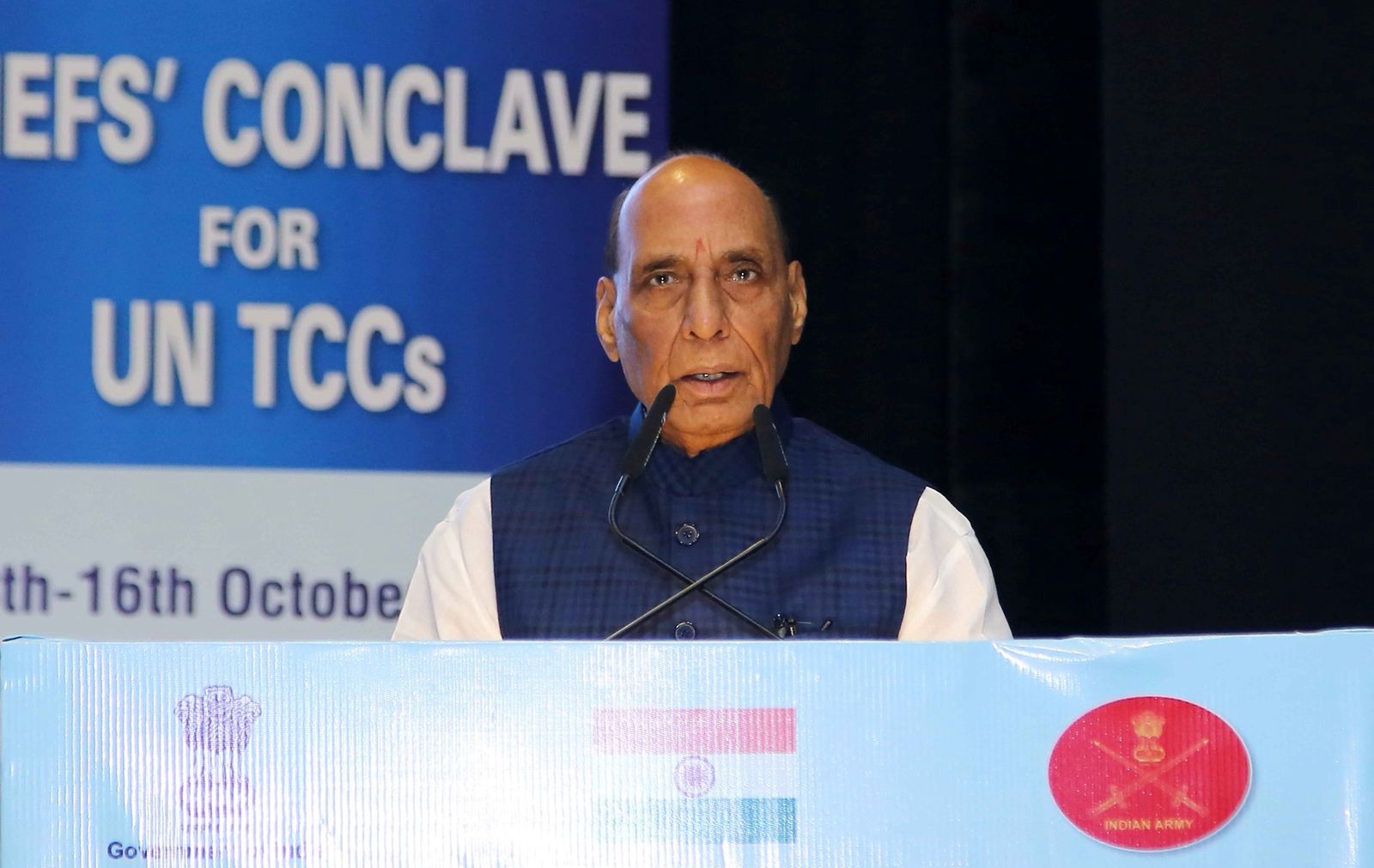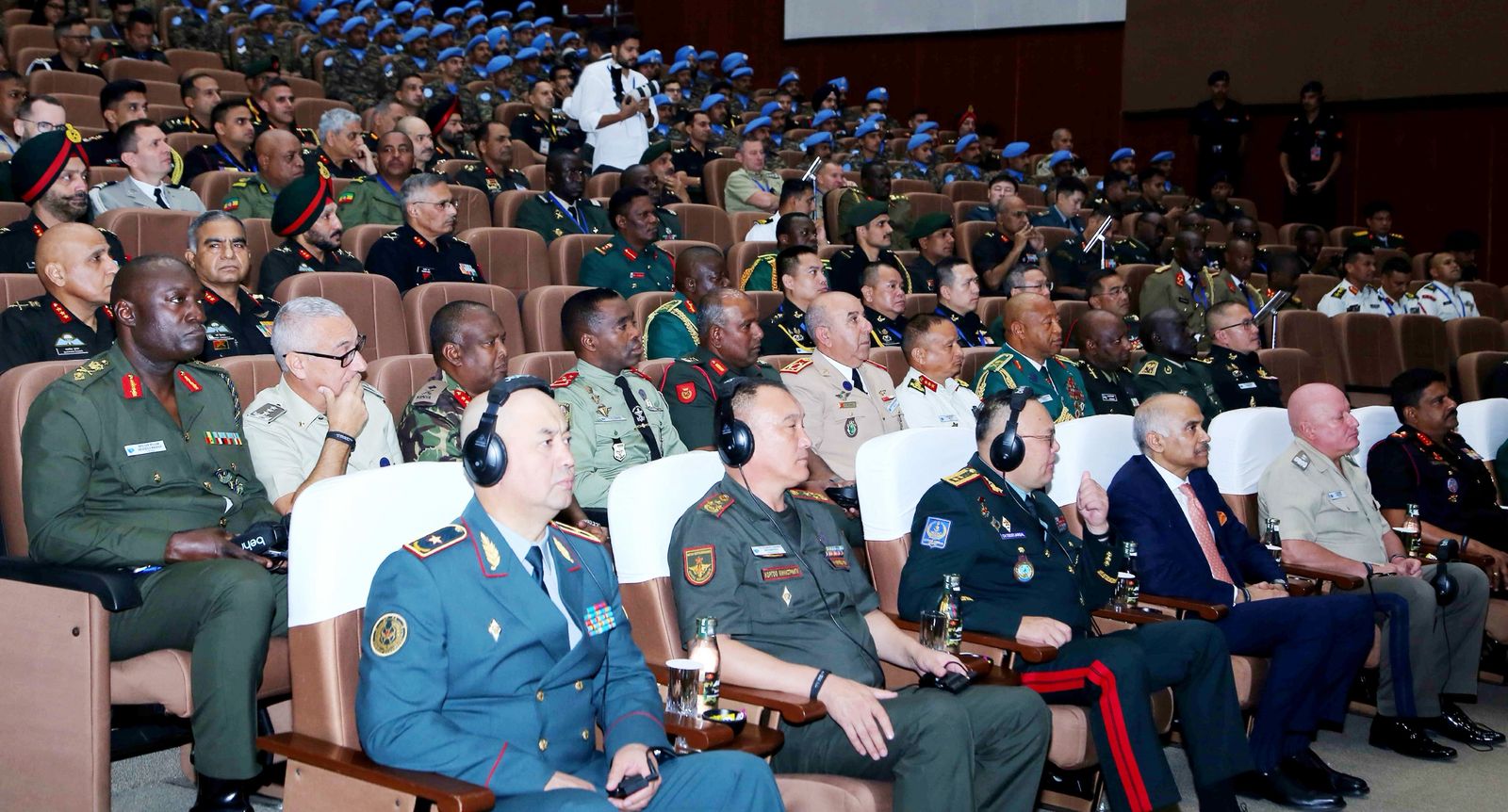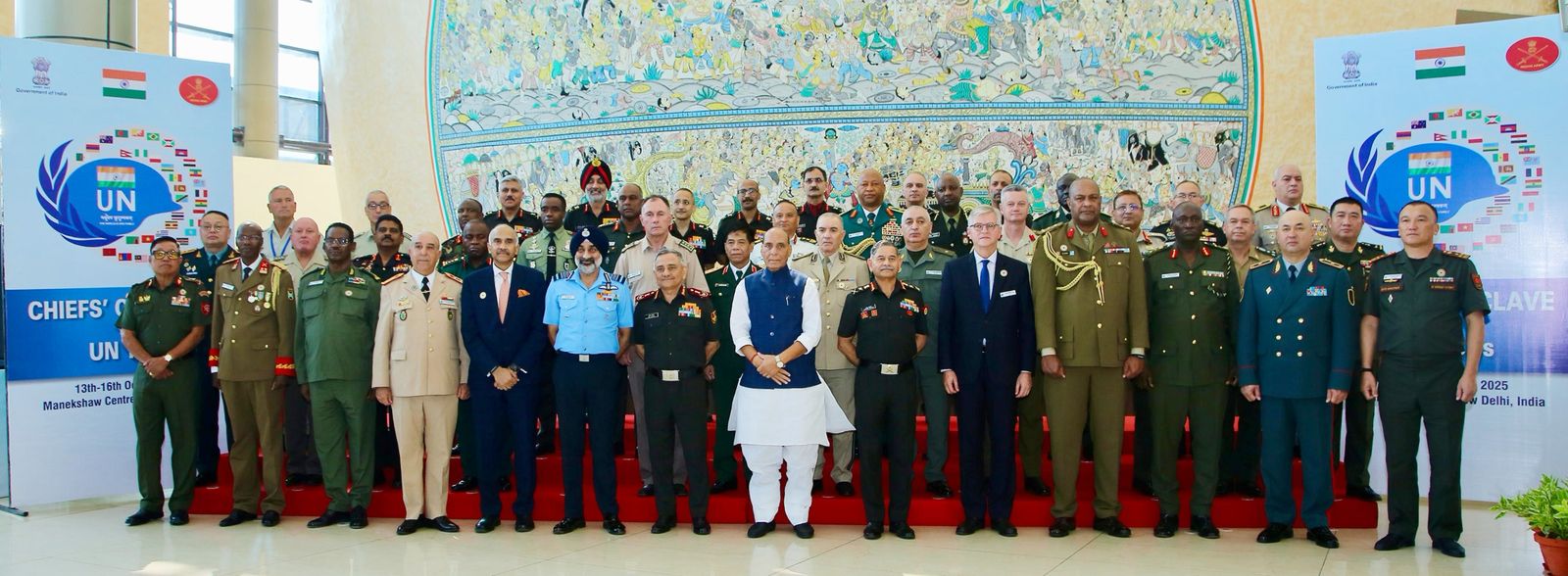
Indian women lead the way in modern UN peacekeeping missions: Raksha Mantri
Text of RM’s speech at the United Nations Troop Contributing Countries’ (UNTCC) Chiefs Conclave in New Delhi.
It is my privilege to address this distinguished audience that brings together the senior military leadership committed to the cause of peacekeeping. The Troop Contributing Countries’ Chiefs Conclave is a reaffirmation of our collective endeavour to uphold peace, stability and human dignity that is enshrined in the Charter of the United Nations.
At the outset I would like to state that the creation of the UN Charter after the devastations of the World War 2 was a significant development. Nations realised that for the development, growth, prosperity and peace is essential. India was a founding signatory of the UN Charter and for us the noble vision of the UN Charter was not new. It reflected India’s own civilisational philosophy of “वसुधैव कुटुम्बकम्”- which teaches us that the world is one family.
Friends, with this noble thought, I would like to express my gratitude to be speaking at this gathering as it is the first time this Conclave is being hosted by India.
The conclave will provide a platform to the senior military leaders from over thirty nations that together contribute majority of UN peacekeepers across the world. And I believe that this platform will be utilised to discuss the current issues involving the UN peacekeeping and its present as well as future challenges. Open discussions such as these also provide us with an opportunity to explore ways and means to mitigate these challenges by strengthening cooperation and coordination among the troop-contributing countries and various stakeholders.
Now-a-days, some nations are openly violating the international rules, some are trying to undermine it, while some want to create their own rules and dominate the next century. In all this, India while, advocating for the reformation of outdated international structures, stands strong in upholding the international rules-based order.
For India, this is not just a talking point, thousands of Indians serve for the cause of peace and development under the UN flag. This is a prominent example that reflects India’s principle of aligning promises with performance and the commitment to upholding international order.
Friends, For India, peacekeeping has never been an act of choice but an article of faith. From the very dawn of our independence, India has stood firm with the United Nations in its mission to maintain international peace and security. India is land of Mahatma Gandhi, where peace is deeply rooted in our philosophy of Ahimsa that is non-violence and Satya that is truth. For Mahatma Gandhi, peace was not merely the absence of war, but a positive state of justice, harmony, and moral strength.
I firmly believe that all Troop Contributing Countries also share our thinking and commitment. We all know that peacekeeping is more than a military mission; it is a shared responsibility. It reminds us that above conflicts and violence, there is humanity that needs to be upheld. And for this reason, when people devastated with war and scarcity see the Blue Helmets, it reminds them that they have not been abandoned by the world.
Friends, the traditional Peacekeeping has evolved and now the UN peacekeepers are engaged not just for monitoring the traditional ceasefire but also for complex
multi-dimensional missions that help societies’ transition from conflict to peace. In essence the evolutionary process of peacekeeping now includes nation building as an important milestone. Through triumphs and trials, the endeavour has demonstrated the enduring value of collective action for global peace.
Over the decades, nearly 290,000 Indian personnel have served in more than 50 UN peacekeeping missions, earning global respect for professionalism, courage, and compassion. From the Congo and Korea to South Sudan and Lebanon, our soldiers, police, and medical professionals have stood shoulder to shoulder with the international community to protect the vulnerable and rebuild societies.
Whether it is building roads that reconnect isolated communities, running hospitals that treat thousands of civilians, or mentoring young officers from other nations, India’s peacekeepers have shown that peacekeeping is as much about humanity as it is about security.
Friends, India piloted a UN General Assembly resolution adopted in June 2023 to establish a memorial wall for fallen peacekeepers at UN Headquarters. This initiative, supported by a record 190
co-sponsorships, aims to honour all peacekeepers who have made the supreme sacrifice.
Our contribution has not been without sacrifice. More than 180 Indian peacekeepers have laid down their lives under the UN flag. Their courage and selflessness are inscribed in the collective conscience of humankind.
We recall with reverence all the peacekeepers, who laid down their lives in for upholding peace. Their courage reminds us, that peacekeepers are often called upon to face dangers as grave as those in any battlefield, but with the added burden of operating under complex mandates and strict rules of engagement.
Friends, Today, peacekeeping faces challenges more complex than ever before. Peacekeepers are deployed in volatile environments where asymmetric warfare, terrorism, and fragile political settlements coexist. They often operate amid humanitarian crises, pandemics, or natural disasters, while also confronting misinformation campaigns that can erode trust and endanger lives.
Meeting these challenges demands more than bravery — it requires adaptability, innovation on part of the troop contributing countries and a comprehensive mission level approach taking onboard relevant political actors, Finance Contributing Countries, and other key players influencing the conflict environment to achieve the mandate.
Peacekeeping operations around the world are facing serious challenges. These operations often fall short due to delayed deployment, inadequate resources, and an insufficient mandate to address the root causes of conflicts. Without addressing the economic and social injustices fueling many of these conflicts, peace efforts risk becoming short-term interventions rather than lasting solutions. Indian experience has seen firsthand that old models of peacekeeping may not always be suitable in diverse cultural contexts. Our approach emphasises respect for local cultures, values, and traditions, which can be a powerful catalyst for sustainable peace.
Friends, we cannot fight today’s challenges with outdated multilateral structures. Without comprehensive reforms, the UN faces a crisis of confidence. For today’s inter-connected world, we need a reformed multilateralism: That reflects today’s realities; Gives voice to all stakeholders; Addresses contemporary challenges; and focuses on human welfare.
Peacekeeping is a collaborative effort that relies on unity of purpose. It is imperative that Troop Contributing Countries, the UN Secretariat, host nations, and regional organisations work in harmony to ensure envisaged outcomes.
For the sustainability of Peacekeeping Operations and way ahead, I urge all Member States, especially those with advanced technological and financial capabilities, to enhance their support — whether through troops, police, logistics, technology, or specialized capacities. Innovations such as secure communications, surveillance systems, and unmanned platforms can make missions safer and more effective.
India is a voice of advocacy on seeking a greater role for troop-contributing countries in mission mandate formulation. Those who serve in the field and bear the risks must have a meaningful voice in shaping the policies that guide their missions.
Friends, India recognises that the success of peacekeeping depends not only on numbers but on preparedness. Our Centre for United Nations Peacekeeping (CUNPK) in New Delhi has trained participants from over 90 countries. The Centre provides immersive scenario- based learning — simulating negotiations with armed groups, humanitarian operations under threat, and civilian protection during crises.
India, historically as the largest UN peacekeeping contributing country, has the necessary credentials to impart training and developing interoperability between peacekeepers from friendly foreign countries to build the mutual understanding that is essential for mission success.
Under Atmanirbhar Bharat, India has developed cost-effective indigenous technologies that strengthen peacekeeping missions in from of land mobility platforms, secure communications, surveillance systems, UAVs and medical support solutions. These innovations enhance situational awareness, responsiveness, and safety. During the conclave, you will have the opportunity to witness first-hand, many of these platforms and systems that are currently deployed by India in various UN missions.
Friends, one of the most inspiring transformations in peacekeeping has been the growing participation of women. Their presence enhances the mission’s effectiveness, builds trust with local populations, and brings empathy into operations that often unfold in deeply human settings.
India has been a pioneer in this domain. Our all-women Formed Police Unit deployed to Liberia in 2007 became a global symbol of empowerment. Their professionalism and compassion inspired a generation of Liberian women to join their national police.
Today, Indian women officers serve in missions across South Sudan, Golan Heights and Lebanon, leading patrols, engaging with communities, and mentoring local women and youth. They represent the best of what modern peacekeeping can achieve — inclusion, respect, and trust. In 2024, an Indian Army woman peacekeeper was awarded the United Nations Military Gender Advocate of the Year Award for her exemplary service with the UN peacekeeping mission in the Democratic Republic of Congo.
Equally vital are our medical peacekeepers — doctors, nurses, and field medics who work tirelessly in challenging conditions. In UN field hospitals across Africa, Indian medical teams have treated thousands of civilians and peacekeepers alike. Their service, often under challenging adversities, embodies the finest traditions of the Indian peacekeepers and ethos of the United Nations in the spirit of humanity.
Friends, as we look towards the future, I would like to talk about 4Cs. This 4C formula may serve as a guiding principle for the nations that contribute towards the UN peacekeeping. I propose the 4Cs, which are enhanced- Consultation, Cooperation, Coordination, and Capacity building. We need to implement this formula to ensure effective communications, meaningful engagement, innovation, and capabilities.
This conclave is a timely opportunity to exchange experiences, learn from one another, and collectively strengthen our ability to meet future challenges. I am confident that the discussions here will yield valuable insights and forge stronger partnerships in support of global peace.
Friends, India remains steadfast in this commitment. We are ready to contribute troops, share expertise, and support reforms that make peacekeeping more effective and accountable. Through cooperation and technology sharing, we can build missions that are better equipped, more adaptive, and more humane.
In an interconnected world, peace and prosperity are mutually reinforcing. India’s aspiration to become a Vishwa Guru, a teacher to the world, is not an assertion of dominance but a call for collaborative and inclusive progress. We believe that by sharing our heritage of non-violence and inner peace, we can enrich UN peacekeeping and peace-building operations, fostering a world order where harmony prevails.
Let us collectively re-imagine peacekeeping to build not only a safer world but a more compassionate and resilient one for future generations.
To strengthen our commitment to UN peace efforts, India will continue to increase training and capacity-building initiatives in the coming years, supporting local resilience against threats to peace and security. We commend the dedication of all UN-peacekeepers and honour those who have made the ultimate sacrifice for a safer world.
I would like to thank the Chiefs of Army Staff for steering this initiative, and all participating nations for their enduring contribution to peacekeeping.
Friends, in conclusion, I will recite a prayer that ancient Indian sages and monks wrote and dreamt for our world.
सर्वे भवन्तु सुखिनः, सर्वे सन्तु निरामया:।
सर्वे भद्राणि पश्यन्तु, मा कश्चिद् दु:ख भाग्भवेत।।
ॐ शान्तिः शान्तिः शान्तिः।
This Sanskrit prayer is a prayer for the world to be happy, healthy, without suffering, and let there be welfare for all.
I hope we realise this dream. May this Conclave mark another step towards deeper collaboration, collective preparedness, and lasting global peace.
Thank you, Jai Hind!

